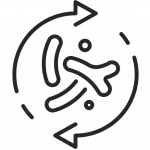Active, yet at risk: high cholesterol in fit individuals

“I’m as healthy as a horse, I exercise, and eat a healthy diet. How can I have high cholesterol?”
This is a question many active individuals ask themselves when they learn about their elevated cholesterol levels. Indeed, the common perception is that high cholesterol is primarily associated with being overweight, unhealthy eating habits, and lack of exercise. However, the reality is more complex. Even people with an active lifestyle and healthy weight can have elevated cholesterol levels, and there may be several unexpected reasons behind it.
Genetics: the cholesterol lottery
One of the main factors influencing our cholesterol levels is genetics. Our genes determine how our body produces, transports, and breaks down cholesterol. Some people have a genetic predisposition to high cholesterol, regardless of their lifestyle. This condition, known as familial hypercholesterolemia, can cause very high LDL cholesterol (“bad” cholesterol) levels from an early age.
While genetics cannot be changed, it’s important to know your family medical history. If there is a history of high cholesterol or heart disease in your family, it is recommended to have your cholesterol levels checked regularly, even if you are healthy and active.
Diet: hidden dangers in healthy foods
Even a healthy diet can contain components that affect cholesterol levels. For example, saturated fats found in animal products like red meat and full-fat dairy products can raise LDL cholesterol levels. Also, some vegetable oils, such as coconut oil and palm oil, can be high in saturated fats.
This doesn’t mean you should completely eliminate animal products or vegetable oils from your diet. Moderation and awareness of what you eat are key. Choose lean meats, opt for low-fat dairy products, and use vegetable oils in moderation.
Other factors: age, gender, and other health conditions
Age and gender also play a role in cholesterol levels. As we age, our cholesterol levels tend to naturally increase. Men generally have higher cholesterol levels than women, but after menopause, women’s cholesterol levels tend to rise.
Certain health conditions, such as diabetes, hypothyroidism, and kidney disease, can also affect cholesterol levels. If you have any of these conditions, it’s important to monitor your cholesterol levels and follow your doctor’s recommendations.
Active lifestyle: important, but not always enough
Although regular physical activity is extremely important for heart health, it may not always be sufficient for preventing or lowering high cholesterol levels. Exercise helps to raise HDL cholesterol (“good” cholesterol) levels, which is beneficial for the heart as it transports cholesterol away from the arteries. In addition, an active lifestyle helps to improve the overall cholesterol profile by reducing LDL cholesterol (“bad” cholesterol) levels, which can cause plaque buildup in the arteries.
However, exercise may not fully compensate for genetic factors that can affect cholesterol production and metabolism. Some people have a genetic predisposition to high cholesterol levels, regardless of their activity level. In addition, an unhealthy diet high in saturated and trans fats, as well as foods high in cholesterol, can negatively impact cholesterol levels even with an active lifestyle.
Therefore, it is important to combine regular physical activity with a healthy diet that includes plenty of fruits and vegetables, whole grains, legumes, and healthy fats. In addition, a doctor may recommend cholesterol-lowering medications in certain cases, especially if lifestyle changes alone are not enough or if there is a high risk of heart disease.
What to Do?
If you are active and have a healthy weight but have high cholesterol, don’t despair. There are several steps you can take to lower your cholesterol levels and improve your heart health:
- Get your cholesterol levels checked regularly: This will help you stay informed about your health status and take necessary action.
- Follow a healthy diet: Reduce your intake of saturated fats, trans fats, and cholesterol-rich foods. Increase your consumption of fruits, vegetables, whole grains, and healthy fats.
- Be physically active: Aim for at least 150 minutes of moderate-intensity or 75 minutes of vigorous-intensity aerobic activity per week.
- Quit smoking: Smoking damages blood vessels and lowers HDL cholesterol levels.
- Limit alcohol consumption: Excessive alcohol intake can raise triglyceride levels.
- Consider medication: If lifestyle changes are not sufficient, your doctor may prescribe cholesterol-lowering medications.
In Conclusion
An active lifestyle and healthy weight are important for heart health, but they do not guarantee normal cholesterol levels. Genetics, diet, age, gender, and other health conditions can also affect cholesterol levels. If you have high cholesterol, it’s important to talk to your doctor to determine the cause and find the best solution for you.
High cholesterol is not a life sentence. With a healthy lifestyle and medication if necessary, you can control your cholesterol levels and reduce your risk of heart disease.
For normal cholesterol level – AteroLip® complex caps!
Sometimes healthy lifestyle changes are not enough to lower cholesterol. Your doctor may also recommend over-the-counter or cholesterol-lowering medications. Take them as directed while continuing to make healthy lifestyle changes, which can help keep your medication dose low.
The turmeric extract contained in the cholesterol control product AteroLip® complex caps helps to maintain a normal blood cholesterol level, the functioning of the cardiovascular system, as well as to normalize liver lipids. Choline helps ensure normal lipid and homocysteine metabolism. Vitamin B12 contributes to the normal formation of red blood cells and helps ensure normal homocysteine metabolism. Niacin and vitamin B12 help ensure normal energy-yielding metabolism.
The complex of natural substances AteroLip® complex caps cares for the heart and helps maintain blood vessels in good condition thanks to the fact that it also contains the natural statin monacolin K, obtained from red yeast rice, policosanol obtained from sugar cane, as well as standardized olive (Olea europea) leaf dry extract (polyphenol hydroxytyrosol).
AteroLip® complex caps are easy to use – only one capsule a day! The product is available in 30 capsules and the advantageous 90 capsules package. The best offer on the Lotos Pharma website www.lotos-pharma.ee.









